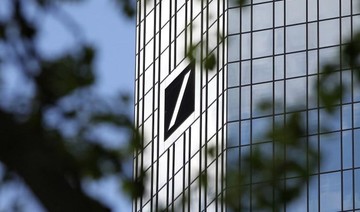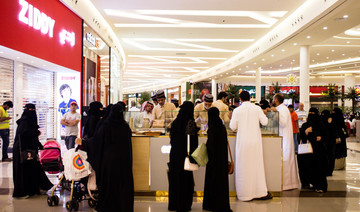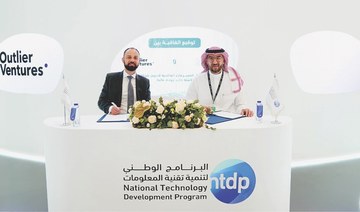Bruno Martorano, head of Abu Dhabi Islamic Bank (ADIB) in the UK, took his first holiday for a while recently, hiking in the Swiss Alps and covering up to 15 kilometers a day.
He described it as “a refresher” following a busy nine months since his appointment as the bank’s UK chief executive. In that time British operations have grown strongly under his command, with a growing number of Saudis joining traditional GCC clients, attracted by investment opportunities in the British property market.
A relaxed and congenial Martorano, interviewed by Arab News in ADIB’s Knightsbridge offices in central London, doubtless finds hiking a good way to clear his head and release the endorphins that make people feel more capable of handling stress.
“Last year it was the Himalayas, the year before that, Bhutan, and hopefully next year it will be Kilimanjaro (in Tanzania),” he said.
Martorano is riding the crest of a wave in the UK as Gulf clients shift their focus away from trophy residential addresses in prime areas of London. Commercial properties in the capital are increasingly in demand, as they are in cities such as Birmingham, Bristol, Manchester, Leeds and Edinburgh, where returns are higher.
The commercial-residential split for ADIB’s property business is now 70-30, compared with 40-60 a year ago.
“Clients continue to be interested in real estate in London, but there is tremendous movement to commercial as investors chase yield rather than safety,” said Martorano.
To put the numbers into perspective, yields in London’s West End are around 4 percent on the residential side. In regional centers, by contrast, commercial properties could offer 5 percent or even 5.5 percent.
The rising familiarity with the UK market among Gulf investors is also a factor behind the shift.
“Many clients have bought enough residential. And they have had a lot of experience investing in the UK, so they feel comfortable to invest in more sophisticated transactions. I think over the next three years the main driver of our business is going to be commercial lending and commercial real-estate financing,” Martorano said.
A private Saudi-based client recently arranged Islamic financing worth $27 million from ADIB to clinch the acquisition of a building called The Hub in Bristol. And business is still growing, says Martorano, with one or two eye-watering deals apparently on the horizon. ADIB UK’s commercial lending pipeline today tops
£200 million ($266 million), with 2018 already looking like a record-breaking year.
While many Britons are still anxious over the UK’s upcoming exit from the EU, there is no sign that GCC buyers are suffering from Brexit blues.
“Our clients are not really exposed to Brexit. Neither is the bank. Clients haven’t raised Brexit as an issue in any of the meetings I have had with them,” Martorano said.
Sterling has fallen, but that means “there is a buying opportunity,” he said.
And while London prices this year have begun to fall for the first time since 2009 — thanks in part to rises in stamp duties and land taxes — Martorano doesn’t subscribe to the view that there could be a further, sharp correction, with areas such as Marylebone already showing signs of recovery.
Italian by birth, Martorano’s mother was half-Lebanese, half- French. He grew up in Beirut, where he went to school. He then moved to Australia and the US, where he built up a banking career. “I went through a couple of Wall Street crashes,” he recalls.
America was followed by spells at French bank BNP in Paris, where he headed up private banking for the Middle East. This was followed by a stint in Hong Kong, after which he joined Mashreq Bank in Dubai as head of wealth management. There was also Arab Bank, where he “jumped” between the UAE, Switzerland and London.
Most recently, he spent five years in Abu Dhabi as head of credit solutions for ADIB, before being tapped to head up the bank’s operations in London.
An internationalist through and through, he is fluent in five languages: Arabic, Italian, French, English and Spanish.
After moving from place to place during a long and distinguished career, does he have a favorite city?
Martorano chuckles at the question, responding with characteristic diplomacy: “Being multilingual and multicultural has allowed me to enjoy each city that I have been in. The key is to try to fit in, and to notice all the small beauties and advantages that each city can offer rather than harking back to a place where you were previously.”
His current role makes Martorano the UK standard-bearer for Abu Dhabi’s largest Sharia-compliant banking institution.
He puts it this way: “We are clearly a Gulf-based bank that is focused on Sharia banking, which for us is Islamic and ethical. Sharia banking is banking as it should be.”
A 2013 study commissioned by ADIB found that in the UK, the proportion of people likely to bank with a financial institution jumped 28 percent after respondents heard about the Islamic banking proposition.
The group’s business has been thriving. In 2017, ADIB at group level chalked up record profits, an 18 percent reduction in provisions for bad or doubtful loans, higher income from fees, and a reduction in the cost of credit.
Such growth comes at a time when GCC banks are still shaking off the effects of the 2014-17 oil price crash. Key balance sheet metrics are looking good: At group level, ADIB reported a full one percentage decline in cost-to-income ratio in 2017.
In the UK, the bank recorded a 20 percent advance in transaction volumes last year compared with 2016. The upward trajectory is expected to continue this year, as the recovery in oil prices is expected to turbocharge confidence throughout the Arabian peninsula.
“We see strong demand among GCC-based clients seeking to diversify their portfolios,” said Martorano.
“Secure, long-term income yields from UK property can form a key part of a balanced portfolio,” he said.
In the interim, global financial monitors are feeling more positive about the GCC banking sector.
Moody’s Investors Service is forecasting credit growth of 5 percent for UAE banks in 2018. Standard & Poor’s said most banks in the GCC, which have been slammed by the impact of sluggish economic growth in recent years, will have turned a corner by the end of the first half of 2018.
There are some headwinds, of course, for the sector as a whole. The cost of risk to banks is set to increase this year due to adoption of new IFRS 9 accounting standards, warned S&P.
But professional services firm Alvarez & Marshall said recently that UAE banks have seen an increase in liquidity, as deposits grow faster than loan advances. It predicted higher loan growth and profitability in 2018 as the local economy improves, non-performing loans decline and higher rates boost net interest margins.
Nevertheless, the world is an uncertain place with trade wars, real wars and rumors of wars unsettling investors from Tokyo to New York.
None of this fazes Martorano, however. “I have been through crises on Wall Street, was around for the Asian meltdown when I was in Hong Kong in 1997, and from my experience when high-net-worth individuals go through uncertain situations, they always seek safety. And traditionally they seek the safety of centers of cities such as London.
“That’s why I am not very concerned with the geopolitical environment, whether it’s in Europe or the GCC. When there are bumps in one place, clients become conservative, but are willing to look at investment opportunities somewhere else.”
Martorano, as you would expect, works long hours, but not too long. Usually, the day starts at 8:30 a.m. and ends at 6:30 p.m., although the day before we spoke he left at 7 p.m.
“The poor doorman was waiting for me to leave, pacing up and down. Yes, long hours are there, but at weekends I am with my family,” he said.
After all, he explained, “you can’t just lock yourself in the office because then you are excluding yourself from the environment you are living in, and that probably doesn’t help anyone.”
Few would disagree with him on that.
ADIB’s Bruno Martorano on Gulf investors’ evolving UK property tastes
ADIB’s Bruno Martorano on Gulf investors’ evolving UK property tastes
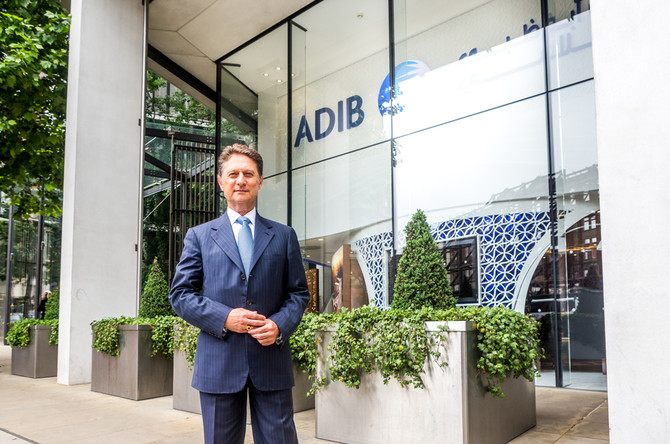
- Gulf investors are increasingly turning to commercial property in search of higher yields
- "When there are bumps in one place, clients become conservative, but are willing to look at investment opportunities somewhere else.”
Stellantis eyes expanding product range in Saudi Arabia, CEO says
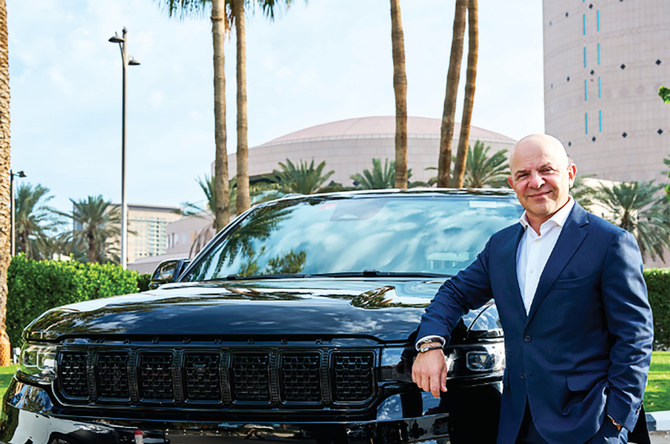
- Dutch-based automobile manufacturer to introduce smart cars and light commercial vehicles into Saudi market
RIYADH: Dutch-based automobile manufacturing corporation Stellantis is planning to expand its product range in Saudi Arabia by introducing smart cars and light commercial vehicles into the market, an official has revealed.
In an interview with Arab News, Samir Cherfan, chief operating officer of Stellantis in the Middle East and Africa, said that the company’s Dare Forward 2030 plan aims to turn the automaker into a mobility tech company.
“Our approach in the Kingdom is multifaceted – and includes driving increased market share by expanding across brands and segments. This will be driven by introducing and expanding models including smart cars and light commercial vehicles under our Fiat, Citroen and Peugeot brands,” said Cherfan.
He added: “Moreover, Jeep is set to grow by reaching customers in new market segments while Ram will strengthen its position in the full-size pickup segment.”
Cherfan noted that Stellantis’ strategy in the Kingdom is aligned with Saudi Arabia’s Vision 2030 objectives.
He added that the company is committed to support Saudi Arabia’s economic diversification efforts and ongoing technological progress.
“By expanding our product range while improving efficiency and adopting new sustainable technologies, we aim not just for market dominance but also to support economic diversification and technological progress in Saudi Arabia,” he said.
Sustainability in focus
During the talk, the COO said that Stellantis’ move to reintroduce the Citroen brand in 2022 was to meet the rising demand for electric vehicles in the Saudi market, as the younger population in the Kingdom are giving priority to sustainability.
“In the Kingdom, Citroën offers a diverse range of vehicles that cater to young buyers – particularly in urban centers like Riyadh and Jeddah – including the growing number of women drivers,” said Cherfan.
He continued: “These younger demographics are typically looking for more sustainable, smaller, smarter models. As EVs produce zero emissions and zero noise, this in turn aligns with Vision 2030 objectives to enhance quality of life and reduce the Kingdom’s carbon footprint.”
According to Cherfan, Saudi Arabia’s economic diversification efforts aimed at reducing the Kingdom’s dependency on oil is also reshaping the automotive market in the country.
He added that Saudi Arabia’s sovereign wealth fund’s strategic investments in various sectors are also helping companies like Stellantis invest in the Kingdom.
“As the Kingdom is looking toward its post-oil economy and becoming more competitive internationally, this change is affecting the automotive market too. With the Public Investment Fund supporting the growth of the Kingdom’s economy by investing in different sectors, this opens doors for companies like Stellantis to invest and grow our business,” said Cherfan.
He added: “At Stellantis, we have a goal to increase our sales in Saudi Arabia and we believe that the Kingdom is a key to our plan to supply 90 percent of the cars and parts needed in the Middle East and Africa from within the region.”
The COO went on to say the company is planning to introduce new EV models in Saudi Arabia soon, as it eyes to grab 30 percent of this market by the end of this decade.
“When it comes to electrification, we are engaged with our Saudi Arabian partners with the objective of incorporating EV models or establishing dedicated EV brands within our product portfolios. Our aim is to have a 30 percent EV share by 2030 as set out in our Dare Forward Strategy,” he continued.
Encouraging local talents in the automotive industry
According to Cherfan, the automotive industry is an employment generator and is expected to grow at a double-digit rate till 2030 in Saudi Arabia as the Kingdom is embarking to ensure clean and autonomous mobility.
The official noted that the company currently has 12,000 employees in the Middle East and Africa region and among them only 20 are expats.
“In the Kingdom, through Stellantis and our distributor partners, we have over thousands of people working across different departments and under multiple brands, and we expect to continue to grow that number as our brands increase their market share,” said Cherfan.
He added that Stellantis aims to position itself as the most localized player in the region.
“We position ourselves as the partner in the country to maximize value creation. We have programs with universities, we have created dedicated training programs to upskill local talent. And with 1.2 billion people in our region, there is a lot of brilliant talent to be further developed,” continued Cherfan.
The company is aiming to achieve 70 percent regional production autonomy by 2030, representing a significant leap from its current level of 25 percent.
The COO said Stellantis aims to sell one million vehicles in the region by 2030, out of which 35 percent will be electric.
Strategic partnership with private and government entities
Cherfan further said that Stellantis’ strategy involves collaborating closely with local businesses, government entities and other stakeholders.
He pointed out that leveraging partnerships with local businesses is necessary to understand the market in Saudi Arabia, while collaborations with government entities is essential to navigate through regulatory frameworks.
“By working hand in hand with local companies, we can tailor our products and services to better meet the needs and expectations of Saudi consumers. Additionally, partnering with local businesses provides opportunities for technology transfer, skill development, and job creation, thereby contributing to the growth of the Saudi economy,” he noted.
Cherfan added: “By partnering with government agencies, we can ensure that our activities are in line with Saudi Arabia’s vision for economic diversification, sustainability, and innovation.”
He noted that government partnerships will also facilitate access to infrastructure and support programs, enabling the company to accelerate its growth and expansion efforts in the Kingdom.
Cherfan also underscored the vitality of collaborating with stakeholders like academic institutions, research centers and industry associations.
“Collaborating with these entities allows us to use cutting-edge research, innovation, and talent pools. By promoting partnerships with academia and research institutions, we can drive technological advancements, develop new products and solutions, and enhance our competitive edge in the Saudi market,” he concluded.
Egyptian startups secure funding to boost expansion to Saudi Arabia following a period of stagnation
Egyptian startups secure funding to boost expansion to Saudi Arabia following a period of stagnation

CAIRO: Startups in Egypt have started to gain momentum with several ventures securing funding to boost expansion efforts to the Kingdom.
Following a period of startup funding stagnation, Egyptian founders have made their way back to the regional venture capital space with a flurry of investment deals and expansion strategies already in place.
Egyptian fintech startup Waffarha has secured a seven-figure seed round from Value Makers Studio to expand its footprint.
Founded in 2012 by Tarek Magdy, the platform offers significant discounts, with daily deals ranging from 50 percent to 90 percent.
The new capital will enable Waffarha to enhance its technology, recruit talent, and expand into Saudi Arabia and additional markets.
Moreover, in 2018, Fawry for Banking Technology and Electronic Payments, one of Egypt’s largest financial institutions, acquired a share of 30 percent of the company.
The company claims to boast a network of over 1,000 merchants and over 3,000 stores that cater to more than 5 million customers, without any subscription fees.
Over the last 12 years, Waffarha claims to have emerged as a top-tier lifestyle website and mobile app.
Egyptian HRtech startup Bluworks secures $1m in pre-seed funding
Bluworks, an HR and Software-as-a-Service solutions provider based in Egypt, has raised $1 million in pre-seed funding led by Khawarizmi Ventures and included Camel Ventures, Acasia Ventures, and angel investors.
Founded in 2022 by Farah Osman, Hussein Wahdan, and Nour Ahmadein, Bluworks aims to optimize costs for businesses through data-driven decision-making.

“With so many HR softwares on the market, not one is built to manage blue-collar workers,” Wahdan said.
“Since the process of managing this type of workforce is so manual, errors frequently occur, leading to penalties and deducted salaries with no oversight from the workers, causing them to leave and ultimately contributing to high turnover rates,” he added.
“Currently, companies can spend about 7-10 days just closing their payroll accounts, but with Bluworks, this time can be cut down to one day - all while leveraging data and insights on their workforce,” he stated.
The company aims to utilize the funding to support its product development goals, expand its presence, and grow its team.
Egypt-based fintech Bokra closes $4.6m pre-seed funding round
Bokra, an emerging fintech startup from Egypt, has secured $4.6 million in pre-seed funding, led by DisrupTech Ventures and SS Capital.
Founded in 2023 by Ayman El-Sawy, Bokra offers diversified investment solutions for retail and SME investors.
The funds will support the launch of the Bokra app, expansion of its investment products, and scaling operations across the Middle East and North Africa region.
“We are dedicated to accelerating financial inclusion and elevating investment awareness across MENA,” El-Sawy said.
“In a region where financial needs and aspirations are ever-changing, Bokra is poised to become the preferred investment platform for both individuals and small and medium-sized enterprises looking to diversify their fractional ownership portfolio in a simple, trackable and informed way,” he added.
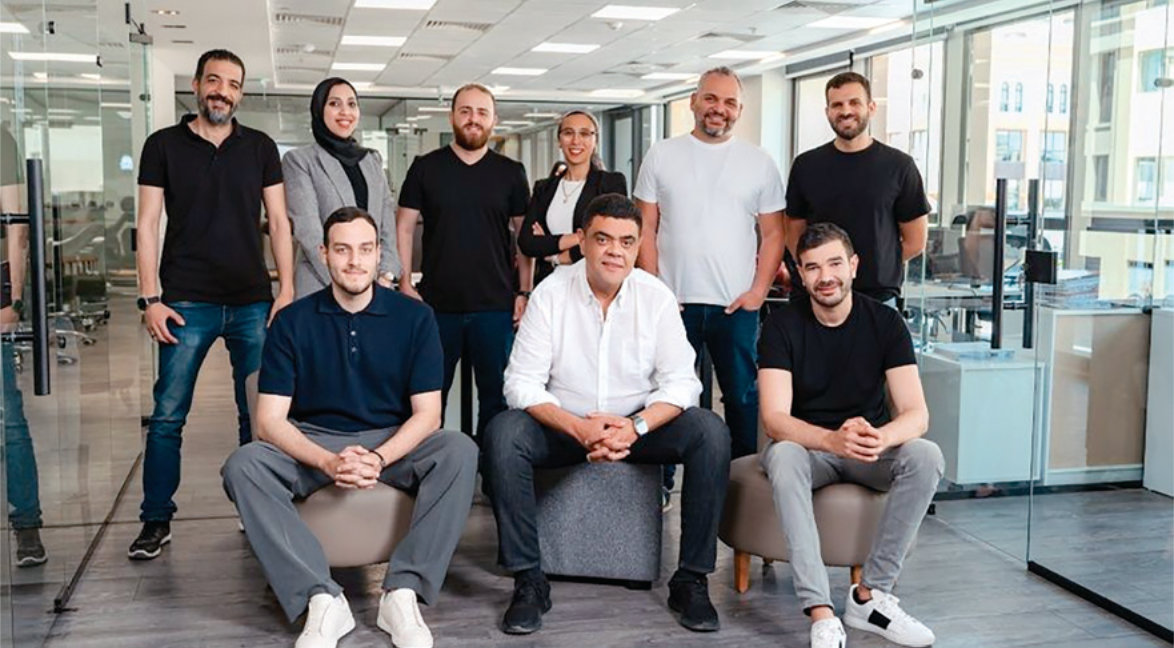
Egyptian startups win big in Saudi-Egyptian program
Ten Egyptian startups have received awards from the VMS Bridge program, aimed at enhancing connections between Egypt and Saudi Arabia’s entrepreneurial ecosystems.
Winners included Amanleek, Farhy, Sprints, Career180, and Jamaykaa, which will explore investment opportunities during a 4-day visit to the Kingdom.
Other winners, Notchnco and Neqabty, received free company licenses in Saudi Arabia, and AgriCash, ReNile, and ICareer won access to Arweqah’s training programs.
Jordan-based healthtech startup Arab Therapy secures $1m seed funding
Arab Therapy, a Jordan-based mental health platform, has raised $1 million in seed funding, led by Flat6Labs and Vision Health Pioneers, with participation from international angel investors.
Founded in 2021 by Tareq Dalbah, Omar Koudsi, and Hekmat Al-Hasi, Arab Therapy connects users with licensed mental health professionals.
The investment will facilitate the company’s market expansion and the initiation of business to business sales operations.
TVM Capital Healthcare invests $17m in Neurocare Group AG
TVM Capital Healthcare, based in the UAE, has invested $17 million into Neurocare Group AG, a Munich-headquartered healthtech specializing in personalized mental healthcare.
The investment will support Neurocare’s expansion plans in the US and Saudi Arabia and fund the development of new hardware and software innovations, enhancing their clinical solutions.
UAE-based logistics startup Shorages secures $1m for expansion
Shorages, a UAE-based logistics startup, has raised $1 million in a pre-series A funding round led by Joa Capital’s S3 Ventures Fund.
Founded in 2019 by Rayan Osseiran, the company provides fulfillment solutions in the UAE and Saudi Arabia for e-commerce platforms.
The company aims to utilize the funding to help expand its warehouse operations across the Gulf region.
UAE e-commerce startup WEE secures $12m in funding
UAE-based e-commerce startup WEE has concluded a $12 million pre-series A funding round, facilitated by SIG Investment.
Founded in 2021 by Anastasia Kim, Oleg Dashkevich, and Sergey Kolikov, WEE is an online marketplace that offers below 15-minutes delivery services.
The investment will be used to spearhead WEE’s logistics capabilities, accelerate growth, and expand its team.
Turkish fintech app Midas closes $45m funding round to boost MENA expansion
Turkish fintech app Midas closed a $45 million funding round by Portage, a global investment platform, supported by International Finance Corporation, Spark Capital and Earlybird Digital East Fund.
Founded by Egem Eraslan, the company allows users in Turkiye to invest in Turkish and US equities.

The startup is aimed at Turkiye’s retail investor market and claims to have more than 2 million users. The company claims to charge significantly lower transaction and commission fees for Turkish customers who want to invest in US or Turkish stocks.
Midas has plans to expand beyond Turkiye, and aims to target countries in the MENA region, according to a report by TechCrunch.
Midas also plans to use the new funding to roll out three new products in cryptocurrency trading, mutual funds and savings accounts.
UAE’s Maalexi signs agreement with Etihad Credit Insurance
Maalexi, a UAE-based risk management platform focused on SME agri-businesses, has entered into a strategic credit insurance agreement with Etihad Credit Insurance, the UAE’s federal export credit company.
This collaboration will enable Maalexi to utilize ECI’s extensive trade credit solutions and services, enhancing the competitiveness of regional SMEs in the food and agriculture trade sectors, both locally and internationally.
The partnership aims to reduce market entry barriers, support Maalexi’s goal of increasing SME participation in the cross-border trade of agricultural produce, and contribute to food security in the UAE.
Open Forum Riyadh to discuss digital currency, AI, and mental health

- The event will run in parallel to the WEF’s Special Meeting on Global Collaboration
LONDON: The Open Forum Riyadh — a series of public sessions taking place in the Saudi capital on Sunday and Monday — will “spotlight global challenges and opportunities,” according to the organizers.
The event, a collaboration between the World Economic Forum and the Saudi Ministry of Economy and Planning, will run in parallel to the WEF’s Special Meeting on Global Collaboration, Growth and Energy for Development, taking place in Riyadh on April 28 and 29.
“Under Saudi Vision 2030, Riyadh has become a global capital for thought leadership, action and solutions, fostering the exchange of knowledge and innovative ideas,” Faisal F. Alibrahim, Saudi minister of economy and planning, said in a press release, adding that this year’s Open Forum being hosted in Riyadh “is a testament to the city’s growing influence and role on the international stage.”
The forum is open to the public and “aims to facilitate dialogue between thought leaders and the broader public on a range of topics, including environmental challenges, mental health, digital currencies, artificial intelligence, the role of the arts in society, modern-day entrepreneurship, and smart cities,” according to a statement.
The agenda includes sessions addressing the impact of digital currencies in the Middle East, the role of culture in public diplomacy, urban development for smart cities, and actions to enhance mental wellbeing worldwide.
The annual Open Forum was established in 2003 with the goal of enabling a broader audience to participate in the activities of the WEF, and has been hosted in several different countries, including Cambodia, India, Jordan and Vietnam.
The panels will feature government officials, artists, civil-society leaders, entrepreneurs, and CEOs of multinationals.
This year’s speakers include Yazeed A. Al-Humied, deputy governor and head of MENA investments at the Saudi Pubic Investment Fund; Princess Reema Bandar Al-Saud, Saudi Arabia’s ambassador to the US; and Princess Beatrice, founder of the Big Change Charitable Trust and a member of the British royal family.
Michele Mischler, head of Swiss public affairs and sustainability at the WEF, said in a press release that the participation of the public in Open Forum sessions “fosters diverse perspectives, enriches global dialogue, and empowers collective solutions for a more inclusive and sustainable future.”
Meituan looks to hire in Saudi Arabia, indicating food delivery expansion

SHANGHAI: Chinese food delivery giant Meituan is seeking to hire staff for at least eight positions based in Riyadh, in a sign it may be looking to Saudi Arabia to further its global expansion ambitions, according to Reuters.
The jobs ads, which is hiring for KeeTa, the brand name Meituan uses for its food delivery operations in Hong Kong, is seeking candidates with expertise in business development, user acquisition, and customer retention, according to posts seen by Reuters on Linkedin and on Middle Eastern jobs site Bayt.com.
Meituan did not immediately respond to a request for comment by Reuters on its plans for Saudi expansion.
Bloomberg reported earlier on Friday that the Beijing-based firm would make its Middle East debut with Riyadh as the first stop.
Since expanding to Hong Kong in May 2023, Meituan’s first foray outside of mainland China, speculation has persisted that its overseas march would continue as the firm searches for growth opportunities, with the Middle East rumored since last year to be one area of possible expansion.
“We are actively evaluating opportunities in other markets,“ Meituan CEO Wang Xing said during a post-earnings call with analysts last month.
“We have the tech know-how and operational know-how, so we are quietly confident we can enter a new market and find an approach that works for consumers there.”
IMF opens first MENA office in Riyadh

RIYADH: The International Monetary Fund has opened its first office the Middle East and North Africa region in Riyadh.
The office was launched during the Joint Regional Conference on Industrial Policy for Diversification, jointly organized by the IMF and the Ministry of Finance, on April 24.
The new office aims to strengthen capacity building, regional surveillance, and outreach to foster stability, growth, and regional integration, thereby promoting partnerships in the Middle East and beyond, according to the Saudi Press Agency.
Additionally, the office will facilitate closer collaboration between the IMF and regional institutions, governments, and other stakeholders, the SPA report noted, adding that the IMF expressed its appreciation to Saudi Arabia for its financial contribution aimed at enhancing capacity development in its member countries, including fragile states.
Abdoul Aziz Wane, a seasoned IMF director with an extensive understanding of the institution and a broad network of policymakers and academics worldwide, will serve as the first director of the Riyadh office.


